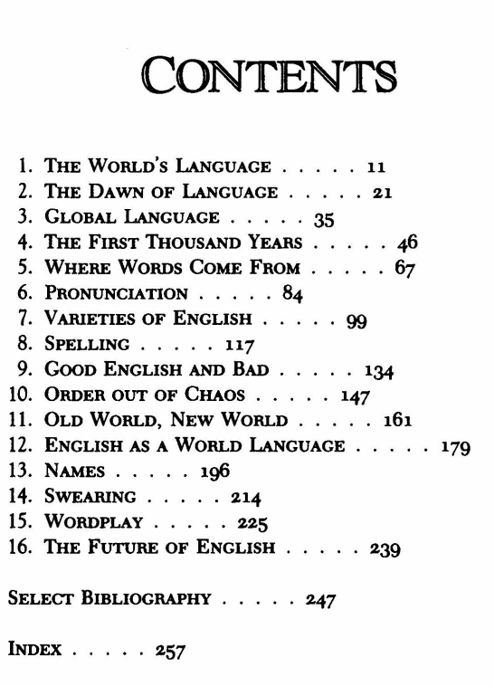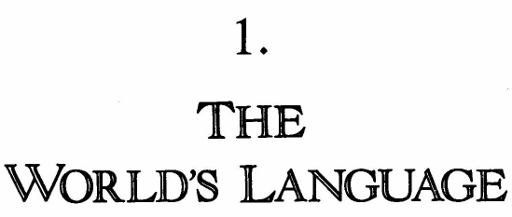The Mother Tongue
Authors: Bill Bryson




MORE THAN
3
00 MILLION PEOPLE IN
the world speak English and the rest, it sometimes seems, try to.
It would be charitable to say that the results are sometimes mixed.
Consider this hearty announcement in a Yugoslavian hotel: "The flattening of underwear with pleasure is the job of the chamber-maid. Turn to her straightaway." Or this warning to motorists in Tokyo: "When a passenger of the f00t heave in sight, t00tle the horn. Trumpet at him melodiously at first, but if he still obstacles your passage, then tootle him with vigor." Or these instructions gracing a packet of convenience f00d from Italy: "Besmear a back-ing pan, previously buttered with a g00d tomato sauce, and, after, dispose the cannelloni, lightly distanced between them in a only couch."
Clearly the writer of
that
message was not about to let a little ignorance of English stand in the way of a g00d meal. In fact, it would appear that one of the beauties of the English language is that with even the most tenuous grasp you can speak volumes if you show enough enthusiasm—a willingness to t00tle with vigor,
as
it were.
To be fair, English is full of b00by traps for the unwary foreigner.
Any language where the unassuming word fly signifies an annoying insect, a means of travel, and a critical part of a gentleman's apparel is clearly asking to be mangled. Imagine being a foreigner and having to learn that in English one tells
a lie
but
the
truth, that a person who says "I could care less" means the same thing as some-one who says "I couldn't care less," that a sign in a store saying
ALL
ITEMS NOT ON SALE
doesn't mean literally what it says (that every 11
THE MOTHER TONGUE
item is
not
on sale) but rather that only some of the items are on sale, that when a person says to you, "How do you do?" he will be taken aback if you reply, with impeccable logic, "How do I do what?"
The complexities of the English language are such that even native speakers cannot always communicate effectively, as almost every American learns on his first day in Britain. Indeed, Robert Burchfield, editor of the
Oxford English Dictionary,
created a stir in linguistic circles on both sides of the Atlantic when he announced his belief that American English and English English are drifting apart so rapidly that within
200
years the two nations won't be able to understand each other at all.
That may be. But if the Briton and American of the twenty-second century baffle each other, it seems altogether likely that they won't confuse many others—not, at least, if the rest of the world continues expropriating words and phrases at its present rate. Already Germans talk about ein
Image Problem
and
das Cash-
Flow,
Italians program their computers with
il software,
French motorists going away for a
weekend break
pause for
les refueling
stops,
Poles watch
telewizja,
Spaniards have a
flirt,
Austrians eat
Big Macs,
and the Japanese go on a pikunikku. For better or worse, English has become the most global of languages, the lingua franca of business, science, education, politics, and pop music. For the airlines of 157 nations (out of 168 in the world), it is the agreed international language of discourse. In India, there are more than 3,000 newspapers in English. The six member nations of the Eu-ropean Free Trade Association conduct all their business in En-glish, even though not one of them is an English-speaking country.
When companies from four European countries—France, Italy, Germany, and Switzerland—formed a joint truck-making venture called Iveco in 1977, they chose English as their working language because, as one of the founders wryly observed, "It puts us all at an equal disadvantage." For the same reasons, when the Swiss com-pany Brown Boveri and the Swedish company ASEA merged in 1988, they decided to make the official company language English, and when Volkswagen set up a factory in Shanghai it found that there were too few Germans who spoke Chinese and too few Chi-
THE WORLD'S LANGUAGE
nese who spoke German, so now Volkswagen's German engineers and Chinese managers communicate in a language that is alien to both of them, English. Belgium has two languages, French and Flemish, yet on a recent visit to the country's main airport in Brussels, I counted more than fifty posters and billboards and not one of them was in French or Flemish. They were all in English.
For non-English speakers everywhere, English has become the common tongue. Even in France, the most determinedly non- English-speaking nation in the world, the war against English en-croachment has largely been lost. In early 1989, the Pasteur Institute announced that henceforth it would publish its famed international medical review only in English because too few peo-ple were reading it in French.
English is, in short, one of the world's great growth industries.
"English is just as much big business as the export of manufactured goods," Professor Randolph Quirk of Oxford University has writ-ten. "There are problems with what you might call 'after-sales service'; and 'delivery' can be awkward; but at any rate the pro-duction lines are trouble free."
[The Observer,
October 26, 19801
Indeed, such is the demand to learn the language that there are now more students of English in China than there are people in the United States.
It is often said that what most immediately sets English apart from other languages
is
the richness of its vocabulary.
Webster's
Third New International Dictionary
lists 450,00o words, and the revised
Oxford English Dictionary has
615,000, but that is only part of the total. Technical and scientific terms would add millions more. Altogether, about
200,000
English words are in common use, more than in German (184,000) and far more than in French (a mere 100,000 ). The richness of the English vocabulary, and the wealth of available synonyms, means that English speakers can often draw shades of distinction unavailable to non-English speak-ers. The French, for instance, cannot distinguish between house and home, between
mind
and brain, between man and gentleman, between "I wrote" and "I have written." The Spanish cannot dif-ferentiate a chairman from a president, and the Italians have no equivalent of wishful thinking. In Russia there are no native words
THE MOTHER TONGUE
for efficiency, challenge, engagement ring, have fun, or take care
[all cited in
The New York Times,
June 18, 198g]. English, as Charlton Laird has noted, is the only language that has, or needs, books of synonyms like
Roget's Thesaurus.
"Most speakers of other languages are not aware that such books exist."
[The Miracle of
Language,
page 54]
On the other hand, other languages have facilities we lack. Both French and German can distinguish between knowledge that re-sults from recognition (respectively
connaitre
and
kennen)
and knowledge that results from understanding
(savoir
and
wissen).
Portuguese has words that differentiate between an interior angle and an exterior one. All the Romance languages can distinguish between something that leaks into and something that leaks out of.
The Italians even have a word for the mark left on a table by a moist glass
(culacino)
while the Gaelic speakers of Scotland, not to be outdone, have a word for the itchiness that overcomes the upper lip just before taking a sip of whiskey. (Wouldn't they just?) It's
sgriob.
And we have nothing in English to match the Danish
hygge
(meaning
"instantly satisfying and cozy"), the French
sang-froid,
the Russian
glasnost,
or the Spanish
macho,
so we must borrow the term from them or do without the sentiment.
At the same time, some languages have words that we may be pleased to do without. The existence in German of a word like
schadenfreude
(taking delight in the misfortune of others) perhaps tells us as much about Teutonic sensitivity as it does about their neologistic versatility. Much the same could be said about the curious and monumentally unpronounceable Highland Scottish word
sgiomlaireachd ,
which means "the habit of dropping in at mealtimes." That surely conveys a world of information about the hazards of Highland life—not to mention the hazards of Highland orthography.
Of course, every language has areas in which it needs, for prac-tical purposes, to be more expressive than others. The Eskimos, as is well known, have fifty words for types of snow—though curiously no word for just plain snow. To them there is crunchy snow, soft snow, fresh snow, and old snow, but no word that just means snow.
The Italians, as we might expect, have over 50o names for different
THE WORLD'S LANGUAGE
types of macaroni. Some of these, when translated, begin to sound distinctly unappetizing, like strozzapreti, which means "strangled priests." Vermicelli means "little worms" and even spaghetti means
"little strings." When you learn that muscatel in Italian means
"wine with flies in it," you may conclude that the Italians are gastronomically out to lunch, so to speak, but really their names for foodstuffs are no more disgusting than our hot dogs or those old English favorites, toad-in-the-hole, spotted dick, and faggots in gravy.
The residents of the Trobriand Islands of Papua New Guinea have a hundred words for yams, while the Maoris of New Zealand have thirty-five words for dung (don't ask me why). Meanwhile, the Arabs are said (a little unbelievably, perhaps) to have 6,000
words for camels and camel equipment. The aborigines of Tasma-nia have a word for every type of tree, but no word that just means
"tree," while the Araucanian Indians of Chile rather more poi-gnantly have a variety of words to distinguish between different degrees of hunger. Even among speakers of the same language, regional and national differences abound. A Londoner has a less comprehensive view of extremes of weather than someone from the Middle West of America. What a Briton calls a blizzard would, in Illinois or Nebraska, be a flurry, and a British heat wave is often a thing of merriment to much of the rest of the world. (I still treasure a London newspaper with the banner headline:
BRITAIN
SIZZLES IN THE SEVENTIES!)
A
second commonly cited factor in setting English apart from other languages is its flexibility. This is particularly true of word ordering, where English speakers can roam with considerable free-dom between passive and active senses. Not only can we say "I kicked the dog," but also "The dog was kicked by me"—a con-struction that would be impossible in many other languages. Sim-ilarly, where the Germans can say just "ich singe" and the French must manage with "je chante," we can say "I sing," "I do sing," or
"I am singing." English also has a distinctive capacity to extract maximum work from a word by making it do double duty as both noun and verb. The list of such versatile words is practically end-less:
drink, fight, fire, sleep,
run,
fund, look, act, view, ape, si-
THE MOTHER TONGUE
